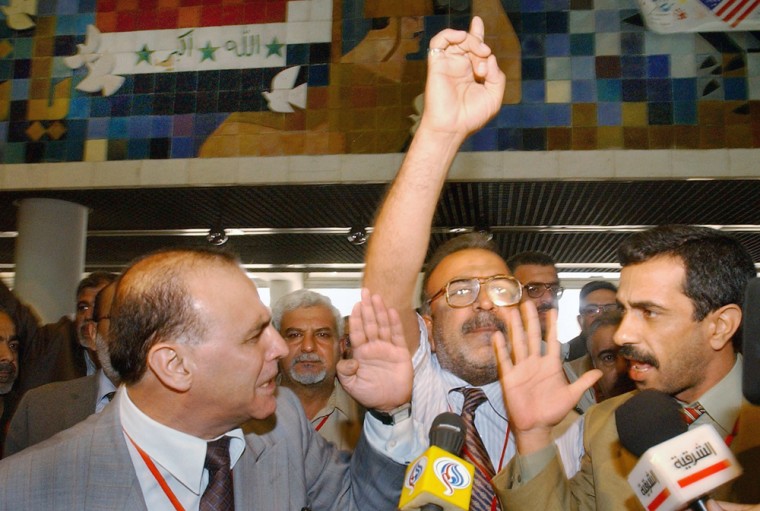They yelled and cursed, waving their hands in angry gestures. Surrounded by heavily armed American troops, they were holed up for days, with Iraq’s future in the balance.
But no one got killed.
In scenes unimaginable under Saddam Hussein, and in sharp contrast to bloody battles in the holy city of Najaf, Iraqis this week formed the country’s first representative council in three decades.
The National Assembly, a 100-member body that will serve as the first measure of checks-and-balances in Iraq’s transition to democracy, will have the power to veto legislation by the country’s interim government serving until national elections in January.
Amid concerns that the two-week-old uprising in Najaf will spread to other Iraqi cities, many see the selection of the assembly over four days of heated debate as a rare piece of good news for the country’s reconstruction effort.
Open forum
“We had no freedom to talk under Saddam,” said Dr. Raja al-Khuzai, a moderate Shiite taking a seat on the new assembly. “Now I can stand and talk in front of 1,300 people.”
A senior U.S. official described the formation of Iraq’s interim National Assembly as an “eye opener” in a region long governed by authoritarian rule.
“I have never seen a group (in the Arab world) speak so freely and so unconsciously,” the official said speaking on condition of anonymity. “Clearly the reason was because there was no ‘big brother’ watching. There was no party line to follow.”
Also in a first for the Arab world, the National Assembly will take a page from the British Parliament – requiring ministers to appear before the assembly to answer questions, a move that could force the government to take responsibility, publicly and on national TV, for its policies.
The official likened the lively debate this week to “group therapy” for a nation forbidden to speak its mind for more than 30 years.
Political muscle
At the conference, over a thousand civic, religious and cultural leaders from all over the country were already flexing their new political muscle.
Delegates representing Iraq’s majority Shiite Muslim population, long oppressed under Saddam’s Sunni Muslim rule, threatened to walk out if the situation in Najaf was not addressed. Before the assembly was formed, delegates dispatched a mission to the Shiite holy city to persuade rebel cleric Muqtada al-Sadr to disband his militia and take a seat at the political table in Baghdad.
Their attempt failed, but only one Shiite delegate walked out.
Several delegates said the dominance of Najaf at the conference, and their quick reaction to a national crisis, demonstrated the future assembly’s ability to form policy.
“People are angry about what is happening in Najaf,” said Hamid al-Khafaie. “They want the bloodbath to stop.”
Iraq’s problems were in plain view for delegates to see. Almost every day, mortars fired by insurgents landed near the Baghdad conference center, located in the U.S.-controlled “green zone” and guarded by U.S. troops.
Elections in January
Nineteen members of the National Assembly, the former members of the U.S.-appointed Governing Council, were guaranteed seats. The remaining 81 members were chosen by lists selected by political groupings among the delegates.
Independent delegates said the process, which was chosen in consultation with U.S. advisors, of favoring more established political organizations.
The U.S. official called those complaints part of Iraq’s “immersion course in political practice and political maneuvering. Many of them had not engaged before in political activity,” he said. “This taught them a lot. Those who didn’t know will be better prepared for elections in January.”
The official called the 100-member assembly a “relatively balanced” list of Iraq’s patchwork of ethnic groups, including Shiites, Sunnis, Kurds, Christians and Turkomens.
